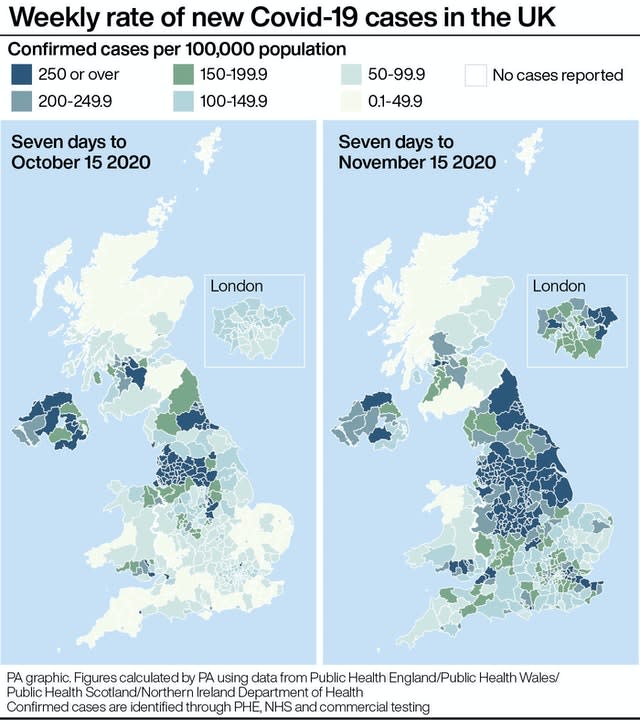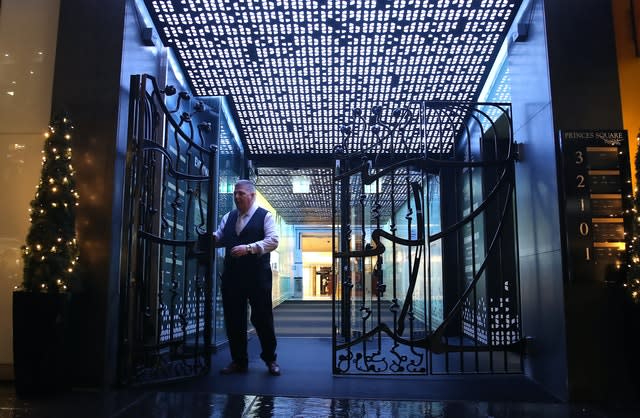New restrictions in Scotland will lower Covid-19 risk at Christmas – Sturgeon
Tougher coronavirus restrictions coming into effect on Friday in Scotland will “lower the risk” of people getting Covid-19 at Christmas, First Minister Nicola Sturgeon has said.
The most populated parts of Scotland, including Glasgow, Stirling and Lanarkshire, will move from Level 3 to Level 4 of the Scottish Government’s five-tier system at 6pm.
Across 11 council areas, non-essential shops, hospitality, gyms and hairdressers will be forced to close and people will be told to stay at home as much as possible.
A ban will also come into law restricting people in Level 3 and Level 4 areas from travelling outside of their council boundaries and on all Scots from entering other parts of the UK or Ireland.
In some of the affected areas shoppers headed to stock up on Christmas presents ahead of the restrictions coming into force.
In Glasgow city centre, queues built up outside shops including Lush, Zara and Jo Malone, despite the cold and wet conditions.
Some stores in the city’s Buchanan Street and Argyle Street – including TK Maxx, Debenhams and House of Fraser – closed ahead of the 6pm deadline, leaving a few frustrated shoppers searching for gifts elsewhere.
Speaking during the Scottish Government’s daily coronavirus briefing, Ms Sturgeon said 32 deaths from coronavirus and 1,018 positive tests had been recorded in the past 24 hours.
While she said infections rates have stabilised in recent weeks, they had stabilised at a stubbornly high level in some areas.
She said the new restrictions will help infection rates come down further before the Christmas period.
“The fact is the fewer people who are in the population who have Covid by the time we get to Christmas, the lower the risk of people being infected with it during that period,” she said.
“It’s very important for me to be clear that the risks would not be zero – which is why we must be very careful about any relaxation over Christmas and people will have to think carefully themselves, even with any relaxation, about what they want to do or not.”
On Thursday, Ms Sturgeon said the chief medical officers of the UK nations have been tasked with developing a “concrete” proposal for household mixing, details of which could be revealed next week.
Ms Sturgeon also said the new travel restrictions are “vital” to ensure there is no need for a national lockdown.
She urged Scots to abide by the new regulations, which could see a £60 fine levied against those who violate the rules unless they have a “reasonable excuse”, such as caring responsibilities or a hospital appointment.
“These travel restrictions – nobody likes them, I don’t like them – but they are vital in helping us minimise these risks,” she said.

“They are vital in helping us avoid having the whole country in the same level or restrictions.
“It is these travel restrictions that mean that even although the central belt has to be in Level 4, we can avoid the Highlands or Edinburgh or parts of the country with lower prevalence being in Level 4 too.”
The First Minister admitted to being “utterly scunnered and fed up” with new coronavirus restrictions.
But she said life could return to some semblance of normality by spring, with the Scottish Government hoping to have vaccinated one million Scots by the end of January.
“These restrictions are difficult and we are all scunnered and fed up, and I’m not going to stand here and pretend otherwise because I feel that same sense of being utterly scunnered and fed up as the rest of you do,” she said.

“But we do now see a possible end in sight and I think it’s really important that we don’t forget that.”
Health Secretary Jeane Freeman set out the Scottish Government plan for vaccination in Holyrood on Thursday.
The First Minister added: “There is a very real prospect for all of us of a substantially more normal way of life being returned to us by the time we reach the spring of next year.
“I hope that encourages us, it won’t make the next few weeks feel any better, but it hopefully will strengthen our resolve to stay safe ourselves, keep our families safe, keep others safe before we reach that point.”

 Yahoo News
Yahoo News 